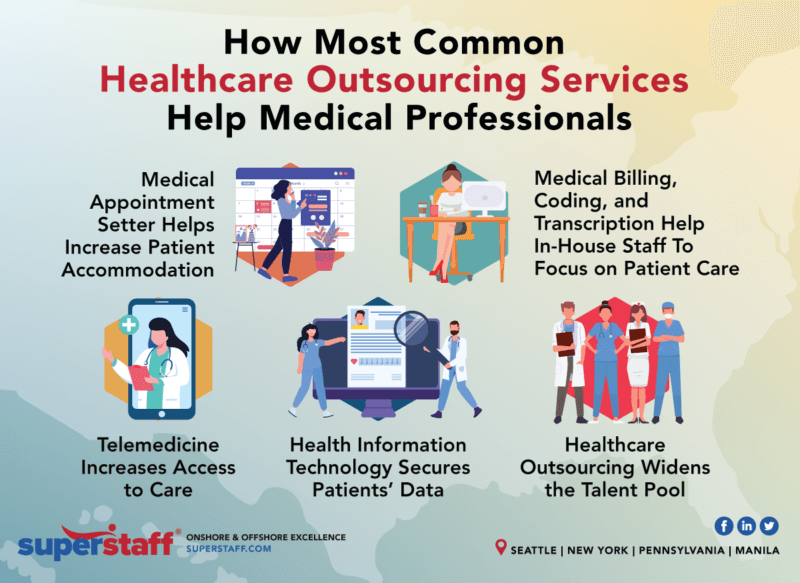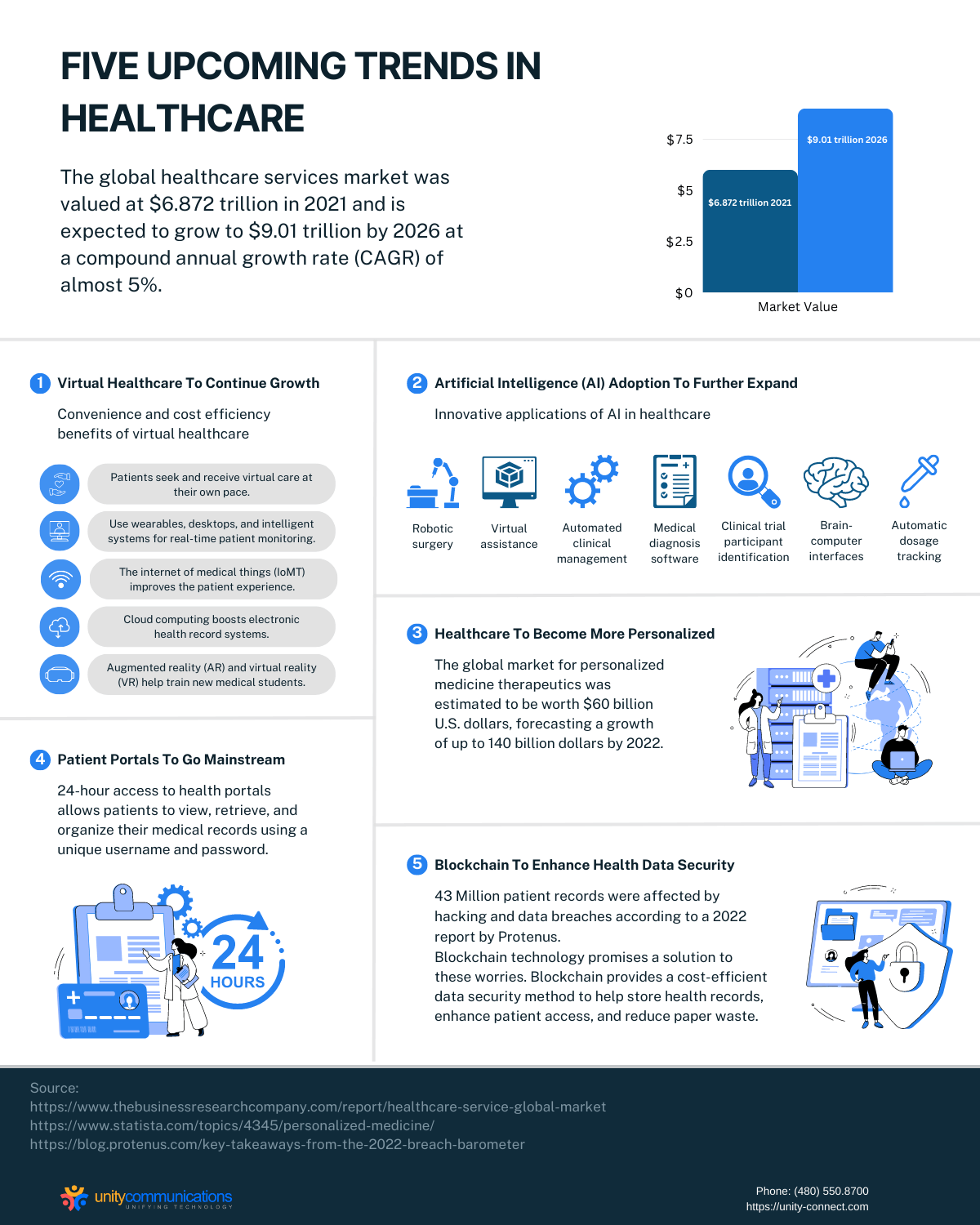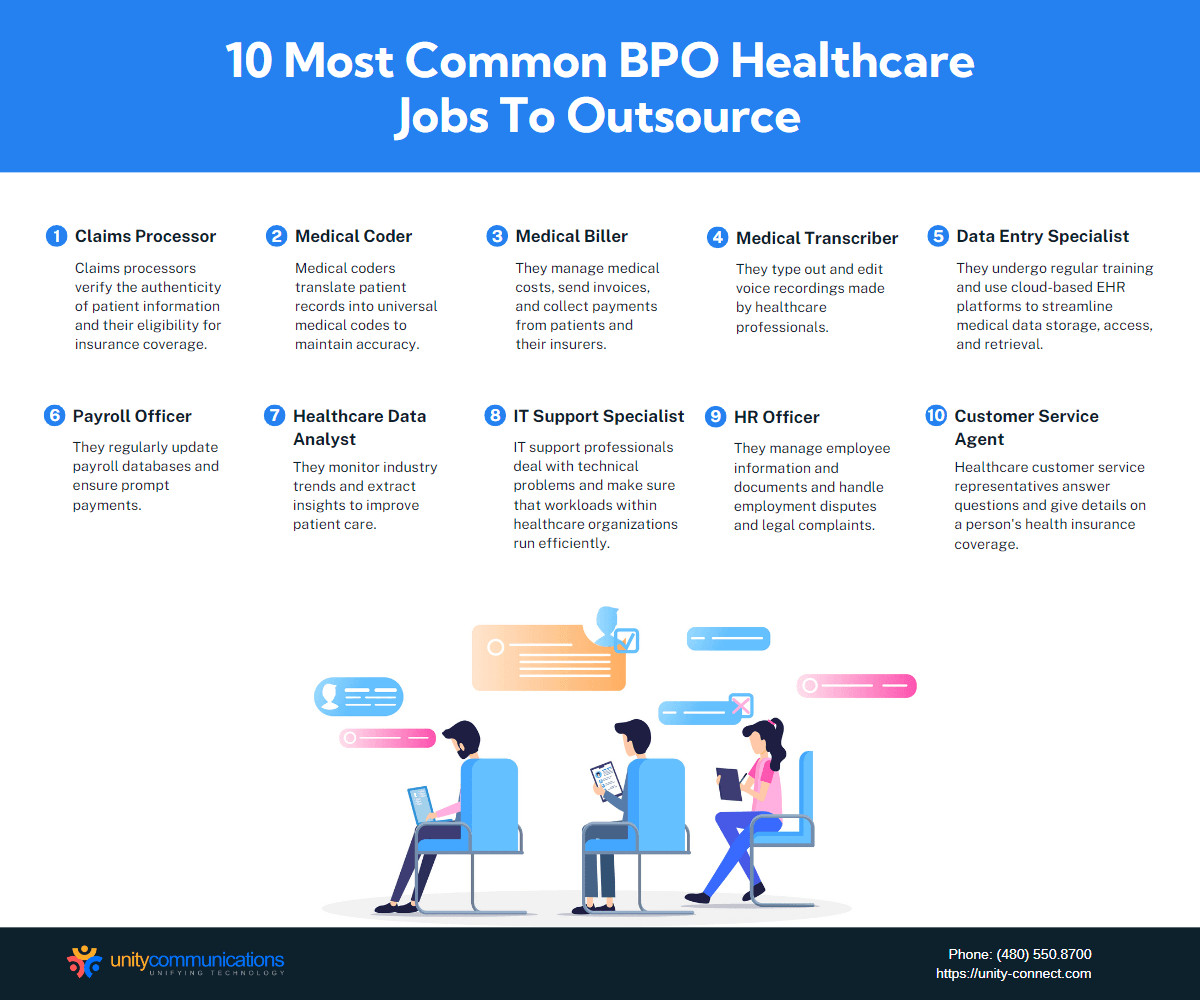In the constantly changing world of global healthcare, the outsourcing market has become a vital strategy for healthcare providers. This approach is instrumental in boosting efficiency, cutting down expenses, and sustaining a competitive advantage. Initially confined to ancillary services, the scope of the healthcare outsourcing industry has expanded significantly. It now includes a wide array of essential functions, ranging from telemedicine to intricate data management processes. This expansion is evident in the healthcare BPO (Business Process Outsourcing) market, which has seen considerable growth.
This article aims to thoroughly examine the prevalent trends, the historical development, and the prospective trajectory of outsourcing in the healthcare sector, with a particular focus on its compound annual growth rate and overall impact on the healthcare landscape.
Historical Context of Outsourcing in Healthcare
Early Trends in Healthcare Outsourcing
The inception of outsourcing in the healthcare sector was initially aimed at handling non-essential activities such as laundry services and the overall management of facilities. This approach allowed healthcare professionals to concentrate more on patient-centric duties. As the global healthcare BPO market began to take shape in the late 20th century, the scope of outsourcing in healthcare broadened significantly. It began encompassing more complex services, including medical billing and meticulous record-keeping. The imperative largely fueled this shift to reduce operational costs and allow medical professionals to focus their attention on delivering core healthcare services. Furthermore, the expansion into these areas was facilitated by the emergence of contract hospital service providers, marking a notable development in the global hospital outsourcing market.
Evolution of Outsourcing Practices
With the progression of technology, the range of services outsourced in the healthcare sector expanded correspondingly. The introduction of digital technologies facilitated the emergence of remote services such as telemedicine, e-health services, and the management of electronic health records (EHR). These advancements have been crucial in enabling remote patient monitoring, significantly enhancing the capabilities of medical providers. Additionally, the globalization of the healthcare industry has been a critical factor, leading to an increase in cross-border outsourcing. This global expansion has allowed medical practitioners to collaborate with third-party service providers from around the world, a move that has been instrumental in cost reduction and the broadening of services offered in the healthcare sector.
Impact of Technological Advancements
The integration of artificial intelligence, machine learning, and big data analytics has revolutionized healthcare outsourcing. These technologies have enabled healthcare providers to offer more personalized care, enhance diagnostic accuracy, and improve operational efficiency.
Current Trends in Healthcare Outsourcing
Overview of Current Trends
The current landscape of healthcare outsourcing is marked by a blend of technological innovation and strategic partnerships. Healthcare providers are increasingly turning to specialized firms to manage complex functions that require specific expertise.
Top 10 Trends in Healthcare Industry Outsourcing
Telemedicine Services
The COVID-19 pandemic accelerated the adoption of telemedicine, with more healthcare providers outsourcing these services to meet the growing demand for remote care.
Artificial Intelligence and Automation
AI is being leveraged to automate administrative tasks like patient scheduling, data entry, and even preliminary diagnostics.
Electronic Health Records (EHR) Management
Outsourcing EHR management has become common, allowing healthcare providers to focus on patient care rather than administrative tasks.
Medical Billing and Coding
The complexity of medical billing and coding, especially in countries like the United States, has led to an increase in outsourcing these functions.
Cybersecurity Solutions
The increasing volume of digital healthcare data has elevated the importance of cybersecurity in protecting sensitive patient information. As a result, the practice of outsourcing cybersecurity functions has become essential in the healthcare industry. This shift towards external cybersecurity services is driven by the need to safeguard patient data against growing cyber threats and breaches.
By relying on specialized cybersecurity firms, healthcare providers can ensure more robust protection of patient records and other confidential health information. This not only helps in complying with stringent data protection regulations but also builds trust with patients, who are increasingly concerned about the privacy and security of their health data in the digital age.
Pharmaceutical R&D
By delegating R&D activities to specialized external firms, pharmaceutical companies can leverage expertise and advanced technologies they may not possess in-house. This collaboration not only streamlines the process of bringing new drugs to market but also allows for a more cost-effective allocation of resources.
The external partners, often equipped with specialized skills and resources, can tackle complex R&D challenges more efficiently, leading to quicker and more innovative drug discoveries. This strategy not only benefits pharmaceutical companies in terms of time and financial savings but also contributes to the overall advancement of medical science by facilitating the faster introduction of new and effective medications to the market.
Healthcare IT Solutions
The decision to outsource the management of IT infrastructure is crucial in ensuring that technology remains current and that system operations are conducted efficiently. By entrusting this aspect to specialized external service providers, organizations can benefit from access to the latest technological advancements and industry best practices.
These providers are often better equipped to implement and manage cutting-edge IT solutions, which might be challenging for in-house teams to keep pace with. This approach not only guarantees that the technological infrastructure is consistently up-to-date but also enhances the overall efficiency and reliability of system operations.
Patient Care and Support Services
Delegating patient education and follow-up care services to external providers plays a significant role in enhancing patient satisfaction and improving health outcomes. By outsourcing these services, healthcare providers can tap into specialized expertise and resources that are often more effective in patient engagement and education.
This approach allows for more personalized and comprehensive care management, particularly in post-treatment scenarios. It ensures that patients receive consistent, high-quality information and support, which is crucial for their recovery and overall well-being.
Furthermore, external providers dedicated to patient education and follow-up can offer more focused and tailored communication, addressing individual patient needs and concerns. This not only leads to better patient adherence to treatment plans but also fosters a sense of trust and satisfaction with the healthcare services received.
Regulatory Compliance and Legal Services
By outsourcing these services, healthcare providers can tap into specialized expertise and resources that are often more effective in patient engagement and education. This approach allows for more personalized and comprehensive care management, particularly in post-treatment scenarios.
It ensures that patients receive consistent, high-quality information and support, which is crucial for their recovery and overall well-being. Furthermore, external providers dedicated to patient education and follow-up can offer more focused and tailored communication, addressing individual patient needs and concerns.
This not only leads to better patient adherence to treatment plans but also fosters a sense of trust and satisfaction with the healthcare services received. Consequently, this strategy contributes to improved health outcomes by ensuring patients are well-informed and supported throughout their healthcare journey.
Supply Chain Management
The effective management of the supply chain has become increasingly crucial, especially during critical times such as the COVID-19 pandemic. This heightened importance has led many healthcare providers to turn to outsourcing as a solution for their supply chain operations.
During crises, the ability to quickly adapt and respond to rapidly changing supply needs is essential. Outsourcing these functions to specialized firms allows healthcare providers to leverage expert knowledge and resources, ensuring a more agile and responsive supply chain.
These external partners are often better equipped to handle the complexities and dynamic nature of supply chain demands, particularly under the pressure of a crisis. This approach not only improves the efficiency and reliability of the supply chain but also allows healthcare providers to maintain focus on their primary goal of patient care, knowing that their supply chain needs are being expertly managed.
Drivers of Outsourcing in Healthcare
Economic Factors
Cost efficiency remains a primary driver for outsourcing in healthcare. Outsourcing services like billing and IT management helps reduce operational costs and allows healthcare providers to allocate more resources to patient care.
Technological Advancements
The rapid advancement in technologies such as AI, telehealth, and big data analytics has made it imperative for healthcare organizations to keep up. Outsourcing to tech-specialized firms offers access to cutting-edge technology without the need for heavy investment in infrastructure.
Regulatory and Compliance Issues
The healthcare industry is heavily regulated, and compliance with these regulations is critical. Outsourcing regulatory compliance and legal services helps healthcare providers navigate these complexities more effectively.
Focus on Core Competencies
Outsourcing enables healthcare providers to focus on their core competency: patient care. By delegating administrative and non-core functions to external experts, healthcare organizations can enhance their service quality and patient outcomes.
Challenges and Considerations
Managing Privacy and Security Concerns
One of the biggest challenges in outsourcing healthcare services is ensuring the privacy and security of patient data. Choosing the right outsourcing partner who can guarantee compliance with data protection laws is crucial.
Ensuring Quality and Compliance
Upholding the quality of healthcare services while ensuring adherence to industry standards is imperative. To achieve this, it necessitates rigorous monitoring and management, especially when it comes to outsourced services. Ensuring that these external services meet the high standards expected in the healthcare sector is crucial for maintaining patient trust and delivering effective care.
This involves not only regular assessments of the quality of services provided by external partners but also making sure that these services align with the prevailing industry regulations and ethical guidelines. Effective management of outsourced services includes establishing clear quality benchmarks, conducting periodic reviews, and fostering open communication channels for feedback and continuous improvement.
By doing so, healthcare providers can guarantee that even when services are outsourced, they remain of the highest quality and in full compliance with industry norms and patient care standards. This vigilant approach to managing outsourced services is essential to sustain the integrity and reputation of healthcare providers in a highly regulated and competitive field.
Dealing with Cultural and Language Barriers
When services are outsourced internationally, there’s often a diversity of languages and cultural norms that need to be navigated. This can lead to potential misunderstandings or miscommunications, which are particularly critical in healthcare settings where clarity and accuracy are paramount.
Overcoming these barriers requires a well-thought-out strategy, including employing staff who are not only proficient in different languages but also culturally sensitive to the needs and expectations of patients from various backgrounds. Additionally, providing cultural competency training to outsourced staff can play a crucial role in mitigating these challenges.
It’s crucial for healthcare providers to ensure that these aspects are addressed so that the quality of patient care and communication remains high, regardless of geographical and cultural distances. This attention to cultural and linguistic nuances is essential for the success of global outsourcing in healthcare, particularly in patient-centered services like telemedicine, where personalized and clear communication is key to effective treatment and patient satisfaction.
Ethical Considerations
Outsourcing in healthcare raises various ethical considerations, including the impact on local employment and the quality of patient care.
Future of Outsourcing in Healthcare
Emerging Technologies
Technologies like blockchain and advanced analytics are set to play a significant role in healthcare outsourcing. Blockchain, for instance, can offer enhanced security for patient data shared with outsourcing partners.
Predictions for Future Trends
The future will likely see an increase in specialized outsourcing as healthcare becomes more personalized and technology-driven. This could include genetic counseling, personalized medicine development, and more advanced forms of telehealth services.
Potential Challenges and Opportunities
The main challenge will be keeping pace with rapid technological advancements and the changing regulatory landscape. However, this also presents opportunities for innovation in healthcare delivery.
Outsourcing in the healthcare industry has evolved from a cost-saving measure to a strategic tool that enhances quality, efficiency, and innovation. While it presents challenges, particularly in data security and regulatory compliance, its benefits regarding access to specialized skills and advanced technologies are undeniable. As the healthcare industry evolves, outsourcing will undoubtedly play an increasingly critical role in shaping its future.







Leave A Comment
You must be logged in to post a comment.